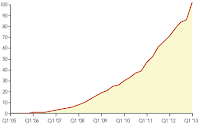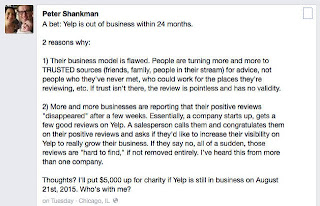Tweet
Earlier this week, we explored the undeniable value of customer experience to the bottom line and studied how Groupon's mediocre user experience is causing lost usage and customers. Today it is Yelp's turn. Is this site's lack of innovation and troubled customer experience undermining Yelp's future?
Pundit Peter Shankman is always good for a colorful observation (and a bit of self promotion). He has loudly predicted that Yelp will fail in the next two years, and Peter is putting his money where his mouth is with a public $5,000 bet for charity if Yelp is still operating on August 21, 2015. His reasoning is based on trust--people trust the opinions of friends and family rather than the complete strangers on Yelp, and Yelp has faced a series of accusations that the company suppresses positive reviews to extort businesses to buy premium services.
Shankman will lose his bet (and I suspect he knows this--his $5,000 investment will do good for charity and be very cheap public relations for Shankman's new customer service consultancy, Shankman|Honig). I agree with Peter that Yelp is skating on increasingly thin ice, but it seem very unlikely Yelp could fail as quickly as Shankman predicts. It still is the number one rating service in the land, with others such as Google Local, Urbanspoon and Foursquare way, way behind. (Plus, unlike Groupon, which we studied yesterday, Yelp's revenue is trending upward, and the company came as close to breaking even last quarter as it ever has).

|
| photo credit: Josh Bancroft via photopin cc |
I agree trust is a huge issue for Yelp, but I see an even bigger problem (or perhaps it is just two sides of the same coin): User experience. Can you name a significant upgrade or feature Yelp has launched in recent years? Neither can I. The last major upgrade I can recall is Monocle, Yelp's augmented reality feature for smartphones, but that was more than three years ago and it is basically an unusable toy--something that looks cool but not a feature many use to locate a nearby business.
The biggest issue that Yelp faces is that the service continues to offer completely undifferentiated and unpersonalized recommendations. You may love sushi, I may love Greek and our friend may adore burgers, but we all get the same results. Why? Yelp certainly knows what we love (and what we do not). Moreover, why can't we tell Yelp who we are dining with and find the restaurants that best suit all of our tastes? Plus, as Shankman notes, where is the value of our trusted social graph in the recommendations offered up by Yelp? Do you want to know what restaurant your friends love or do you care that a bunch of people unlike you recommend the Olive Garden for great Italian cuisine?
Offering personalized services like these is vital for Yelp's future. If Yelp doesn't get it right, someone else will. While any competitive new ratings service will face an uphill battle against Yelp to get a critical mass of users and reviews, someone is going to do it right if Yelp does not. (Are you paying attention Google, or are you satisfied with the success of your social efforts to date?)
To be fair, Yelp is showing no signs of weakening. The site continues to report growing traffic, and a recent survey conducted by Nielsen on Yelp's behalf demonstrated the company's firm hold of local discovery and advice. Nielsen found that an impressive 93% of people said their use of Yelp at least occasionally led to a local purchase.

|
| Yelp's Unique Monthly Visitors |
There is no evidence Yelp is yet facing any serious competition, but that should not stop the company from doing more to enhance its customer experience. After all, in June 2006 Myspace surpassed Google as the most visited website in the US, but just 22 months later Facebook surpassed Myspace and never looked back. If voices like Shankman's grow louder, it will not take much for a more customer-focused service to reverse Yelp's momentum just as Facebook did to Myspace.
As a word of caution to Yelp, I offer myself as an example of a seemingly loyal Yelp customer who could be quickly lost. I use Yelp a lot--at least once every week or two--and I have been a Yelp Elite since 2010. But my commitment is not to Yelp but to others who read my reviews and share their own. If a service comes along that offers better customer experience and more personalized ratings, I will gladly leave behind my 373 reviews to embrace something better. It is only a matter of time before a more innovative rating-and-review site gains attention, and if Yelp gets Myspaced, it will be its own fault.
Do you agree? Do you share Peter's lack of trust in Yelp's platform? Would you prefer more customized recommendations, as I do? And do you see any risk to Yelp in the future? I'd welcome your comments and criticisms below.



4 comments:
I expect Yelp will still *exist* in two years, but I believe it will be pathetically limping along, dreaming of its glory days. Yelp has been far too slow to embrace change and its actions are too little, too late. (Seriously, how long did it take to get the ability to submit reviews on mobile?) They have a great opportunity - the amazing personalisation opportunities you mentioned are perfect examples - but I see no sign that the company will act on it as a leader. At best, some other hot new thing will come out and they'll try to play catch up. I don't see great things in their future.
Augie,
Agree that Yelp isn't going anywhere but disagree with your points that it must innovate or die.
Yelp provides a very utilitarian value to the user -- honest and at least in my experience, accurate reviews of restaurants, attractions, etc. that I can consult to help me make a purchase (usually restaurant) decision.
So the value in the platform isn't in user experience so much as user database. That also creates a huge barrier to entry because a new, shinny object with a slicker interface or better experience might pop up but until it can create the amount of trusted data that Yelp has -- I don't think it can overcome Yelps first mover advantage.
Michele, True story: I was on a panel with the Yelp founder back in 2009, and afterwards I told him his app needed to allow reviews via mobile. He insisted people wouldn't put text into their phones and this wasn't a necessary feature. It DID take them YEARS too long to do allow mobile reviews, and it was because they somehow ignored the enormous growth of texting, emailing and social on the mobile platform.
Converse,
Don't get me wrong--I am not deriding the value of the reviews. You are correct that those hold great value.
The problem is that reviews are, in the end, just data. Yelp right now is simply vomiting the data back to users with no customization. Everyone can filter things by distance or rating and see exactly the same thing, but is that what we really want?
I don't like Asian food. Yelp certainly knows this. Yet when I open Yelp the first four results are all Sushi and Chinese.
I certainly am not arguing against the wisdom of the crowd, but Yelp's failure to turn that data into something more personalized--to provide users with the same sort of personalized discovery tools that have become common on Spotify, Amazon, Twitter and thousands of other services--is leaving Yelp vulnerable, in my opinion.
Post a Comment